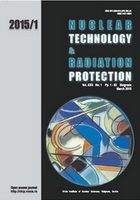
THE EFFECT OF MESH DIVISION OF A VOLUME SOURCE ON CALCULATED RADIATION FLUX DISTRIBUTION
Pages: 55-60
Authors: Kyung-O Kim, Chul-Gyo Seo, and Byung Chul Lee
Abstract
A sensitivity analysis of a point kernel code was performed to investigate the effect of mesh division of a volume source on the radiation flux at points of interest. The QAD-CGGP, known as a representative point kernel code, was employed for a series of calculations and these calculation results compared with the reference data obtained from the MCNP5-1.60 code. The spherical volume source widely used in radiation shielding was also considered in this work and the mesh division along the radius was performed in two ways (regular and irregular). In addition, an approximate equation was defined to correct the significant error that occurs as an outcome of the point source assumption. As a result, in the case of a regular mesh division, a minimum mesh size of 1 cm is required to produce accurate results in comparison to the MCNP ones, while in the other instance, a half-level mesh division is sufficient to obtain the same result from the standpoint of the level of accuracy. In addition, by introducing the approximate equation presented in this paper, a significant error resulting from the point source assumption is exponentially reduced from a maximum of ~30% to a maximum of ~11%. Therefore, it is to be expected that the appropriate level of mesh division is required so as to increase the accuracy of the calculation using a point kernel method.
Key words: spherical volume source, point kernel method, QAD-CGGP, radiation shielding
FULL PAPER IN PDF FORMAT (3.03 MB)
